Fuel Hose/Pipes Replacement - Chassis Pickup
Removal Procedure
- Disconnect the fuel feed and return pipes from the chassis pipes. Refer to Metal Collar Quick Connect Fitting Service .
- Remove the fuel bundle bracket nut.
- Raise and suitably support the vehicle. Refer to Lifting and Jacking the Vehicle in General Information.
- Remove the fuel bundle clips (2) from the transmission brackets (1).
- Disconnect the chassis harness from the retaining clips.
- Remove the fuel system cooler, if necessary. Refer to Fuel Cooler Replacement .
- Disconnect the chassis fuel pipes from the fuel tank pipes. Refer to Plastic Collar Quick Connect Fitting Service .
- Remove the fuel bundle nuts from the chassis.
- Loosen the electronic brake control module (EBCM) bracket bolts (4).
- Allow the EBCM to remain loose in order to allow fuel pipe clearance.
- Remove the fuel bundle using the following procedure:
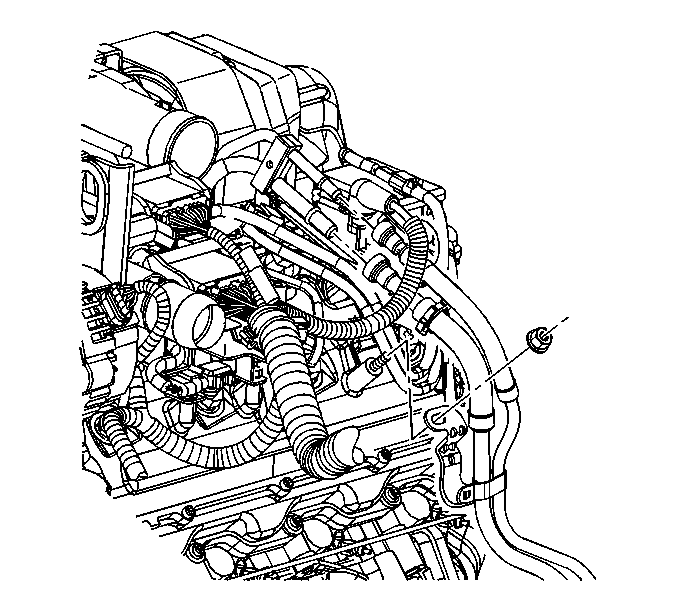
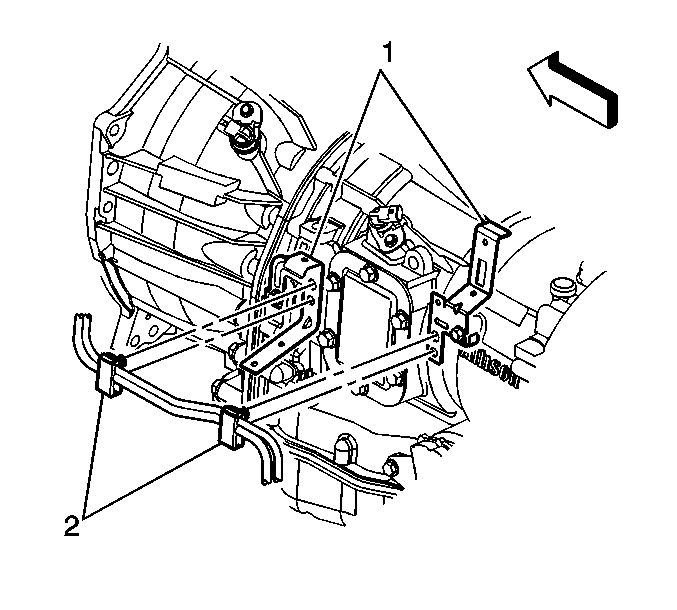
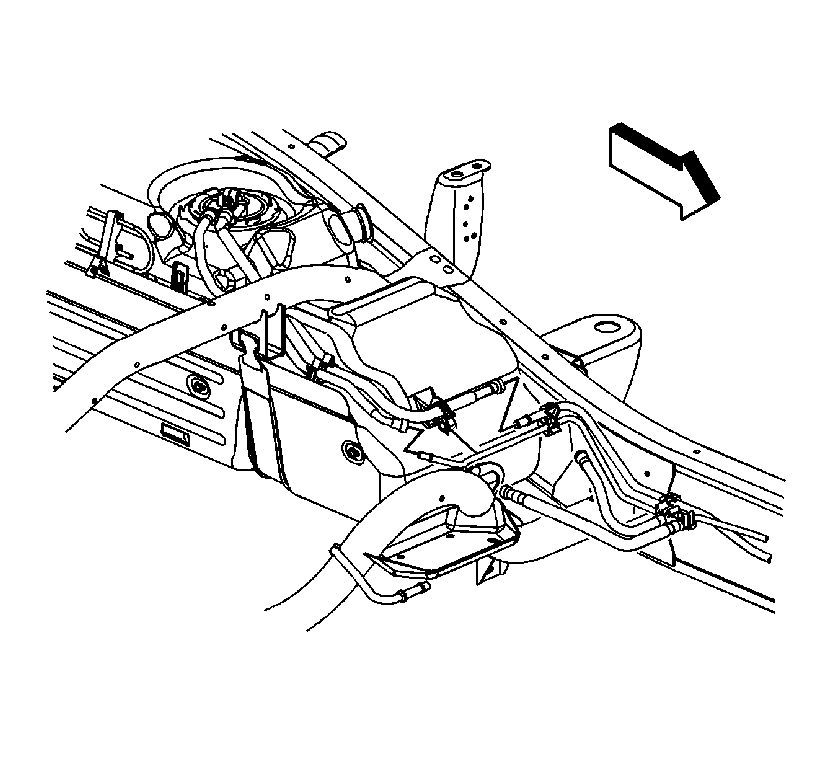
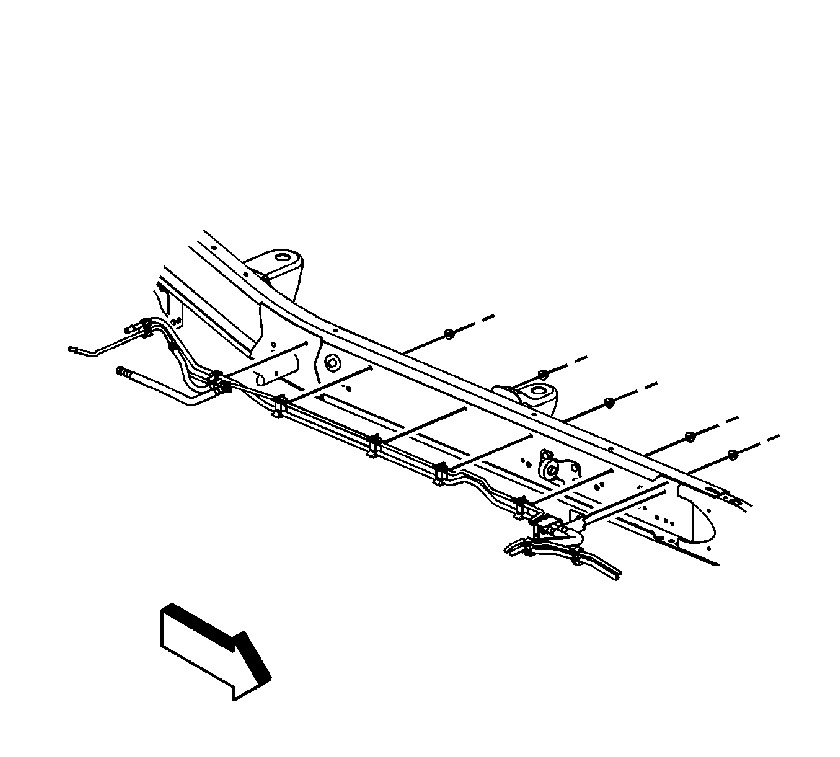
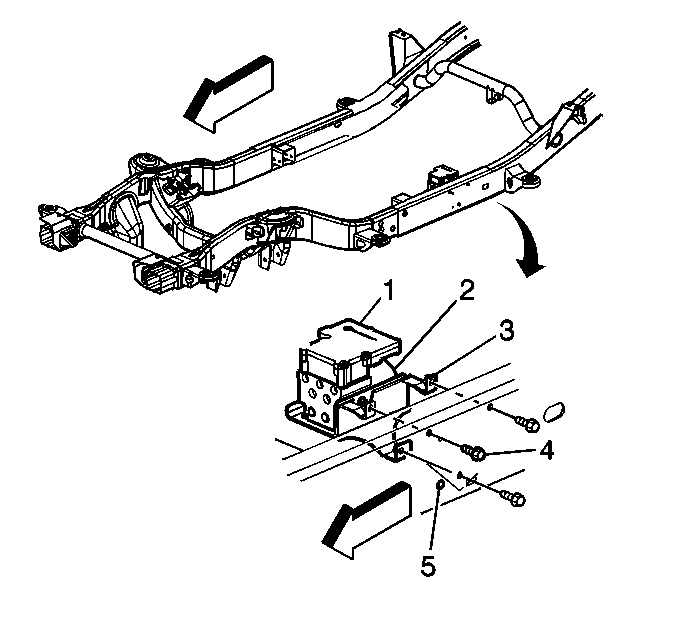
| 11.1. | Guide the fuel bundle (2) pipes towards the rear of vehicle to clear the engine. |
| 11.2. | Lower the fuel bundle while moving it foreword and out. |
Installation Procedure
- Install the fuel pipe bundle using the following procedure:
- Install the fuel bundle nuts to the chassis.
- Connect the chassis fuel pipes to the fuel tank pipes. Refer to Plastic Collar Quick Connect Fitting Service .
- Install the fuel system cooler, if necessary. Refer to Fuel Cooler Replacement .
- Connect the fuel bundle clips (2) to the transmission brackets (1).
- Tighten the EBCM bracket bolts (4).
- Lower the vehicle.
- Install the fuel bundle bracket.
- Install the fuel bundle bracket nut.
- Connect the fuel feed and return pipes to the chassis pipes. Refer to Metal Collar Quick Connect Fitting Service .
- Purge the air from the fuel system.

| 1.1. | Install the fuel bundle to the chassis by guiding the pipes towards the rear of vehicle. |
| 1.2. | Lift the fuel pipes, while guiding the forward portion of the pipes up towards the engine connections. |
Notice: Use the correct fastener in the correct location. Replacement fasteners must be the correct part number for that application. Fasteners requiring replacement or fasteners requiring the use of thread locking compound or sealant are identified in the service procedure. Do not use paints, lubricants, or corrosion inhibitors on fasteners or fastener joint surfaces unless specified. These coatings affect fastener torque and joint clamping force and may damage the fastener. Use the correct tightening sequence and specifications when installing fasteners in order to avoid damage to parts and systems.
Tighten
Tighten the nuts to 16 N·m (12 lb ft).



Tighten
Tighten the bolts to 25 N·m (18 lb ft).

Tighten
Tighten the nut to 16 N·m (12 lb ft).
Fuel Hose/Pipes Replacement - Chassis Cab/Chassis
Removal Procedure
- Disconnect the fuel feed and return pipes from the chassis pipes. Refer to Metal Collar Quick Connect Fitting Service .
- Remove the fuel bundle bracket nut.
- Raise and suitably support the vehicle. Refer to Lifting and Jacking the Vehicle in General Information.
- Remove the fuel bundle clips (2) from the transmission brackets (1).
- Disconnect the chassis harness from the retaining clips.
- Remove the fuel system cooler, if necessary. Refer to Fuel Cooler Replacement .
- Disconnect the chassis fuel pipes from the fuel tank pipes. Refer to Plastic Collar Quick Connect Fitting Service .
- Remove the fuel bundle nuts from the chassis.
- Loosen the electronic brake control module (EBCM) bracket bolts (4).
- Allow the EBCM to remain loose in order to allow fuel pipe clearance.
- Remove the fuel bundle using the following procedure:



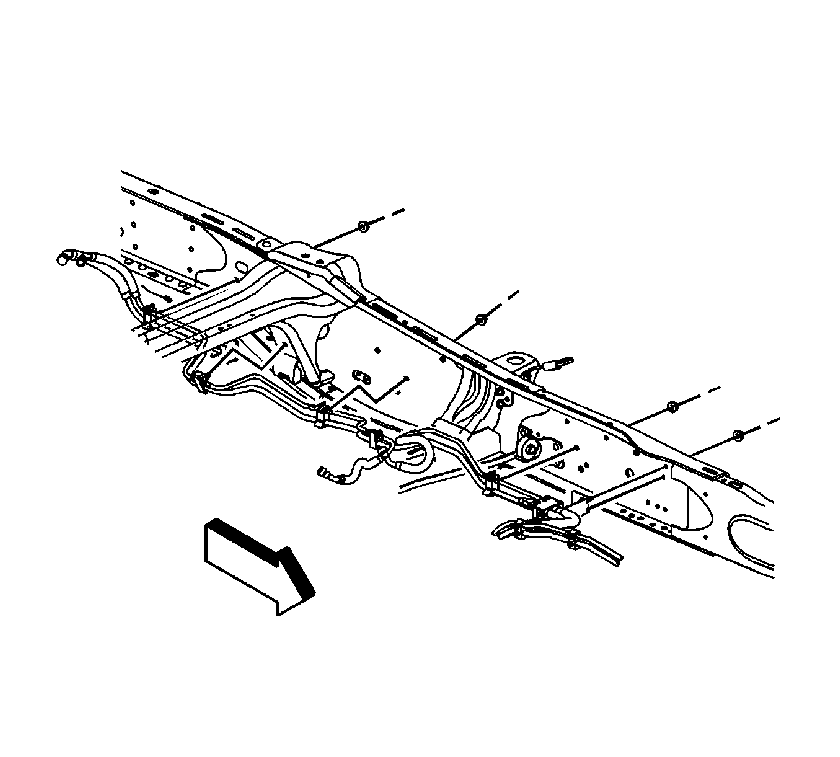

| 11.1. | Guide the fuel bundle (2) pipes towards the rear of vehicle to clear the engine. |
| 11.2. | Lower the fuel bundle while moving it foreword and out. |
Installation Procedure
- Install the fuel pipe bundle using the following procedure:
- Install the fuel bundle nuts to the chassis.
- Connect the chassis fuel pipes to the fuel tank pipes. Refer to Plastic Collar Quick Connect Fitting Service .
- Install the fuel system cooler, if necessary. Refer to Fuel Cooler Replacement .
- Connect the fuel bundle clips (2) to the transmission brackets (1).
- Tighten the EBCM bracket bolts (4).
- Lower the vehicle.
- Install the fuel bundle bracket.
- Install the fuel bundle bracket nut.
- Connect the fuel feed and return pipes to the chassis pipes. Refer to Metal Collar Quick Connect Fitting Service .
- Purge the air from the fuel system.

| 1.1. | Install the fuel bundle to the chassis by guiding the pipes towards the rear of vehicle. |
| 1.2. | Lift the fuel pipes, while guiding the forward portion of the pipes up towards the engine connections. |
Notice: Use the correct fastener in the correct location. Replacement fasteners must be the correct part number for that application. Fasteners requiring replacement or fasteners requiring the use of thread locking compound or sealant are identified in the service procedure. Do not use paints, lubricants, or corrosion inhibitors on fasteners or fastener joint surfaces unless specified. These coatings affect fastener torque and joint clamping force and may damage the fastener. Use the correct tightening sequence and specifications when installing fasteners in order to avoid damage to parts and systems.
Tighten
Tighten the nuts to 16 N·m (12 lb ft).



Tighten
Tighten the bolts to 25 N·m (18 lb ft).

Tighten
Tighten the nut to 16 N·m (12 lb ft).
Fuel Hose/Pipes Replacement - Chassis Cab/Chassis w/Balance Pump
Removal Procedure
- Remove the front fuel tank. Refer to Fuel Tank Replacement .
- Remove the auxiliary fuel tank. Refer to Fuel Tank Replacement .
- Disconnect the pressure balance pump electrical connector (1).
- Remove the fuel pipes bundle nuts.
- Remove the fuel pipes bundle.
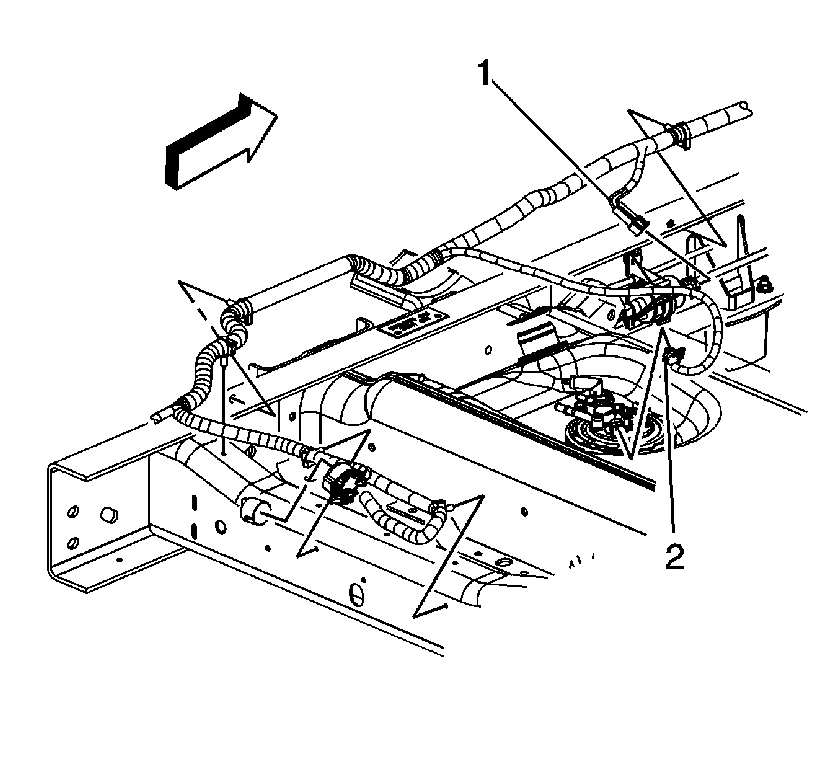
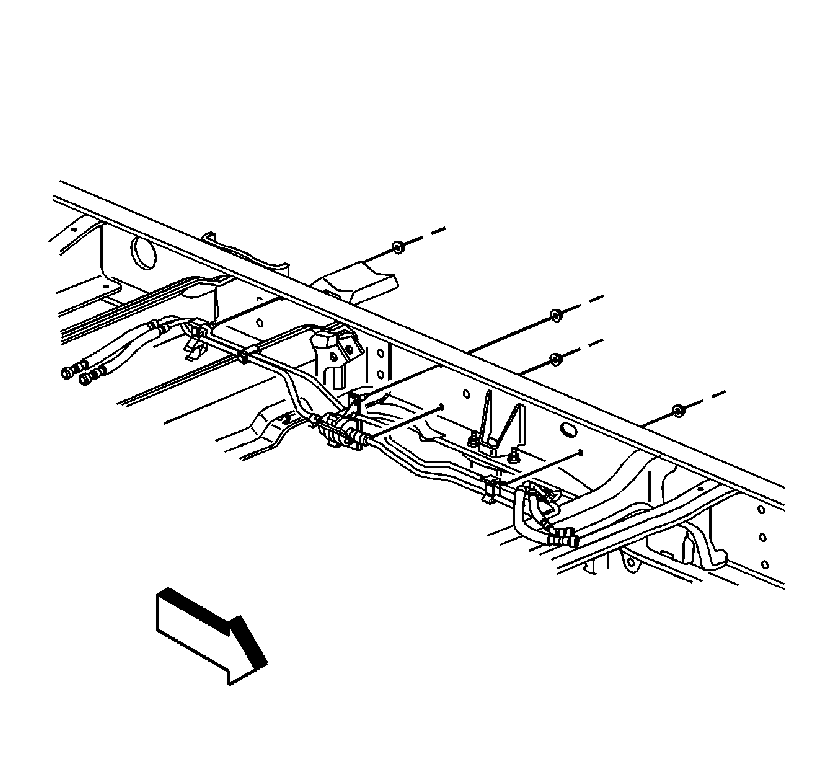
Installation Procedure
- Install the fuel pipes bundle.
- Install the fuel pipes bundle nuts.
- Connect the pressure balance pump electrical connector (1).
- Install the auxiliary fuel tank. Refer to Fuel Tank Replacement .
- Install the front fuel tank. Refer to Fuel Tank Replacement .

Notice: Use the correct fastener in the correct location. Replacement fasteners must be the correct part number for that application. Fasteners requiring replacement or fasteners requiring the use of thread locking compound or sealant are identified in the service procedure. Do not use paints, lubricants, or corrosion inhibitors on fasteners or fastener joint surfaces unless specified. These coatings affect fastener torque and joint clamping force and may damage the fastener. Use the correct tightening sequence and specifications when installing fasteners in order to avoid damage to parts and systems.
Tighten
Tighten the nuts to 16 N·m (12 lb ft).

